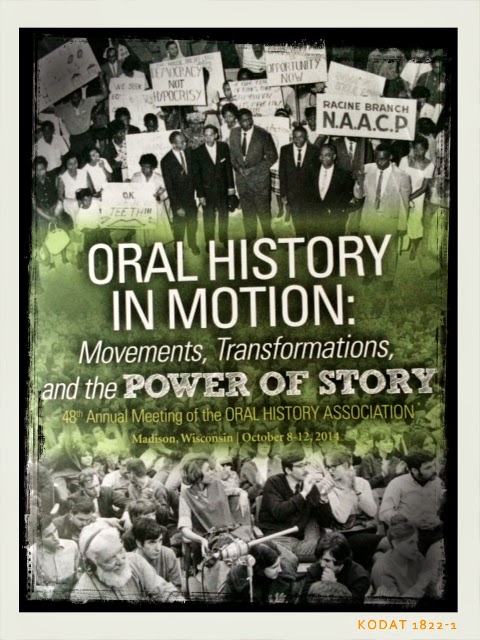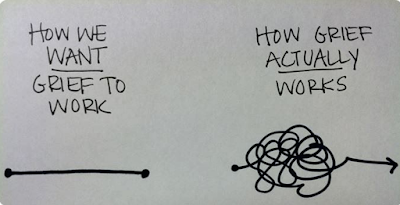Nostalgia: A Cost/Benefit Analysis
 |
| Lisa, my grandfather and I on a fall day long ago |
Last week, I was complaining about my life. Why so little of this? Why so much of that? Why so difficult? Blah blah blah. And my friend, my dear friend of these four decades, said, "You've got to stop it. You have to let it go."
"Stop what?" I asked. She said, "Nostalgia. It's all nostalgia."
"Huh? Nostalgia for what?"
And then she schooled me on nostalgia.
As the historian of memory, I like to think I know a little something about nostalgia.
However, I still tend to defer to the expert on the subject, the late Svetlana Boym, for definitions and etymologies:
In her words:
"The word “nostalgia” comes from two Greek roots: νόστος, nóstos (“return home”)
and ἄλγος, álgos (“longing.”) I would define it as a longing for a home
that no longer exists or has never existed. Nostalgia is a sentiment of loss and
displacement, but it is also a romance with one’s own fantasy.... Restorative nostalgia stresses nóstos> (home) and attempts a transhistorical reconstruction of the lost home. Reflective nostalgia thrives in , the longing itself, and delays the homecoming—wistfully, ironically, desperately. Restorative nostalgia does not think of itself as nostalgia, but rather as truth and tradition. Reflective nostalgia dwells on the ambivalences of human longing and belonging and does not shy away from the contradictions of modernity. Restorative nostalgia protects the absolute truth, while reflective nostalgia calls it into doubt."
displacement, but it is also a romance with one’s own fantasy.... Restorative nostalgia stresses nóstos> (home) and attempts a transhistorical reconstruction of the lost home. Reflective nostalgia thrives in , the longing itself, and delays the homecoming—wistfully, ironically, desperately. Restorative nostalgia does not think of itself as nostalgia, but rather as truth and tradition. Reflective nostalgia dwells on the ambivalences of human longing and belonging and does not shy away from the contradictions of modernity. Restorative nostalgia protects the absolute truth, while reflective nostalgia calls it into doubt."
When I think of nostalgia, I suppose I think of it through Boym-tinted glasses. For me, nostalgia is a process, a means for approaching the essences within our longing. Rather than a clear cut wish for things to be what they once were, I understand nostalgia as grounded in the understanding that they never will be. I've always thought there were benefits to nostalgia -- a distillation of complicated memories and the emotions they both provoke and reflect, a momentary relinquishing of present worries and fears --- a refuge that is simultaneously a call towards what matters most.
Lisa, however, had a different definition of the term. She suggested that a creeping nostalgia defines our expectations. A sense of what we thought our lives would and should be like --- and even more, what our parents wanted our lives to be like when we were younger and they were envisioning our futures -- constantly competes with the actuality of our lives -- our successes, our failures, the quotidian worlds we have crafted from the hand we've been dealt.
Dissatisfaction is the result of the constant measuring up to a vision we or others had for us a long time ago. Instead of judging ourselves based on barometers that might have made sense to our parents, we need to come to construct our own definitions of happiness, stability, success. For Lisa, nostalgia weighs us down; it is a tired longing for things that never even were.
I have been thinking about this ever since. It is such a different way of understanding nostalgia and I am still not convinced that this is what I would call it. But there is truth in this vision of the inner commentator on one's happiness and success. We all know that the target for happiness, contentedness, etc. is a moving one, right? One is never "done."
But at the same time, there exists this kind of incessant historic narration -- a past vision of future well being and success that updates itself according to your progress and process -- while somehow remaining steeped in received messages that are many many many years old. Outdated. Probably irrelevant.
Lisa's solution is to let it go. The, "I should have this by now." Also, the, "I should have achieved that." It has been really interesting because it allows some things to fade (like, my two-person family needs two cars.) And it allows other things to become more visible as that which I value, I want, I intend to strive for. It makes things clearer.
Old friends. Pretty awesome.










Comments
Post a Comment